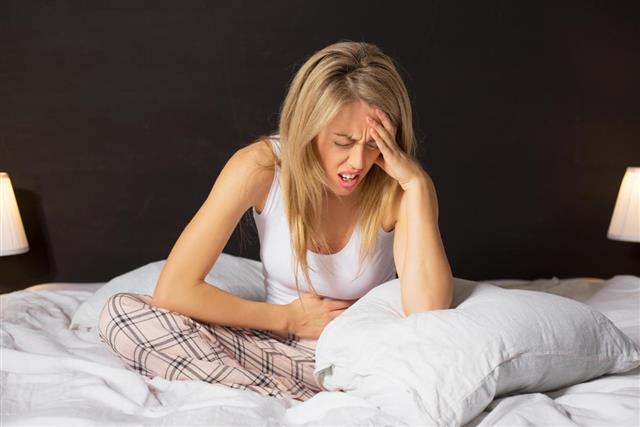
Pain after bowel movement could be indicative of medical conditions such as proctitis, hemorrhoids, anal fissures, inflammatory bowel disease, etc. This HealthHearty write-up provides information about these medical conditions.
Constipation is one of the common conditions that is indicative of poor digestion. It is characterized by infrequent bowel movements, incomplete evacuation of bowel, and straining during bowel movements due to hardening of the stools. Anus is the opening at the end of the digestive tract through which the stool passes, whereas rectum is the terminal end of the digestive tract, and is connected to the anus. Pain after bowel movements could be attributed to medical conditions affecting these structures.
Contributing Factors
Hemorrhoids, also called piles, is a condition that is characterized by the presence of swollen and inflamed veins in the anus and lower rectum. It could occur due to severe or chronic constipation wherein the affected individual has to frequently strain during bowel movements. It could also affect pregnant women due to the increased pressure on these veins. It could be internal, which means the swollen veins could be located inside the rectum. It could be external, which means that swollen veins could develop under the skin around the anus.
Anal Fissures
Pain during and after bowel movements is one of the common symptoms of anal fissures. An anal fissure is a tear in anoderm, which is a specialized tissue that lines the anal canal. The tear runs from the anus to the anal canal. It could occur in individuals affected by chronic constipation. Since this area contains a large number of nerves, trauma to this region can cause pain. Passing a large, hard stool could be the reason behind the development of an anal fissure. Repeated episodes of diarrhea could also be a contributing factor. Sometimes, women could develop a fissure after childbirth.
Anal Fistula
An anal fistula results from anal abscess, which may form when the glands located in the anus become blocked and infected. An anal fistula is a small channel that joins the infected gland within the anus to an opening on the skin near the anus. People affected by Crohn’s disease, sexually transmitted diseases, trauma, diverticulitis, etc., are more likely to develop an anal fistula. It can give rise to symptoms such as pain with bowel movements, pain around the anus, irritation of the skin around the anus, bleeding, fever, fatigue, etc.
Proctitis
Inflammation of the lining of the rectum is medically referred to as proctitis. It could be caused due to sexually transmitted infections, inflammatory bowel diseases (ulcerative colitis or Crohn’s disease), trauma to the anorectal region, etc. The symptoms of this condition include soreness in the rectal and anal area, intermittent rectal bleeding, pain during and after bowel movement, diarrhea, discharge from the anal region, etc.
Inflammatory Bowel Disease
Crohn’s disease and ulcerative colitis are placed in the category of inflammatory bowel diseases. Ulcerative colitis is characterized by the development of ulcers and inflammation of the lining of the colon and the rectum. It gives rise to abdominal pain, urgency to have a bowel movement, cramping, rectal bleeding, loss of appetite, weight loss, fatigue, etc. Crohn’s disease is also characterized by inflammation in the lining of the gastrointestinal tract. It gives rise to symptoms such as abdominal pain, cramping, diarrhea, blood in stool, weight loss, loss of appetite, anal fissures, etc.
On a concluding note, pain during and after bowel movements could be caused by several medical conditions. Thus, it is essential to seek medical assistance for the proper diagnosis and treatment of the underlying cause.
Disclaimer: The information provided in this article is solely for educating the reader. It is not intended to be a substitute for the advice of a medical expert.



